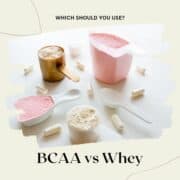Whey Protein vs BCAA | What The Difference Is & Why You Need
This post may contain affiliate links. All opinions shared are my own. As an Amazon Associate I earn from qualifying purchases. Click to view our full disclosure.
All content is created by humans – not AI.
It can be overwhelming to figure out which type of protein supplement you need. Depending on your primary goal, one supplement may be more beneficial to hitting your goals. Below, we’ll compare whey protein vs BCAA’s to help you find the best option for your lifestyle.

Working out is a great way to improve your body and mind. But continued exercise day after day can also take a toll on your body. That’s why many athletes look for supplements to help replace the lost nutrients that come along with a hard workout.
If you’re concerned you’re not getting enough protein, branch chain amino acids (BCAAs) or whey protein supplements could be a great way to get in your daily protein intake.
You may be wondering which is best though – whey protein vs BCAA. Both supplements have benefits and drawbacks, so taking the time to learn about each option is the best way to figure out which one is right for you.
Quick Overview of Whey Protein & BCAA
- Whey supplements are a complete protein source with 3 BCAAs in it — as well as other important amino acids.
- Whey powder is a convenient way to get important protein to assistant in muscle repair and strength.
- Whey can be used as a meal replacement.
- BCAA supplements can help boost your energy level and reduce your muscle soreness.
- BCAA won’t help in building muscle like whey protein will though.
- You may not need BCAA supplements if you’re consuming enough high quality protein already.
- If you’re taking whey protein, you probably don’t need BCAAs.
- Both BCAA and whey protein both come in powder form and are convenient.
- Our favorite BCAA is Bad Athletics.
- For whey protein, we like Garden of Life Raw Organic Protein Vanilla Powder.
Protein is essential to the muscle building process. Protein helps build and repair muscle tissue, and it’s an essential nutrient for the body.

How Much Protein Do You Need to Gain Muscle?
The average person needs .8 to 1 grams of protein per pound of body weight, and fitness enthusiasts need around 1.5 grams of protein per pound of body weight because of their workouts.
Protein can also help you feel satiated which can help with weight loss.
Read more: How Many Protein Shakes a Day Can I Drink?
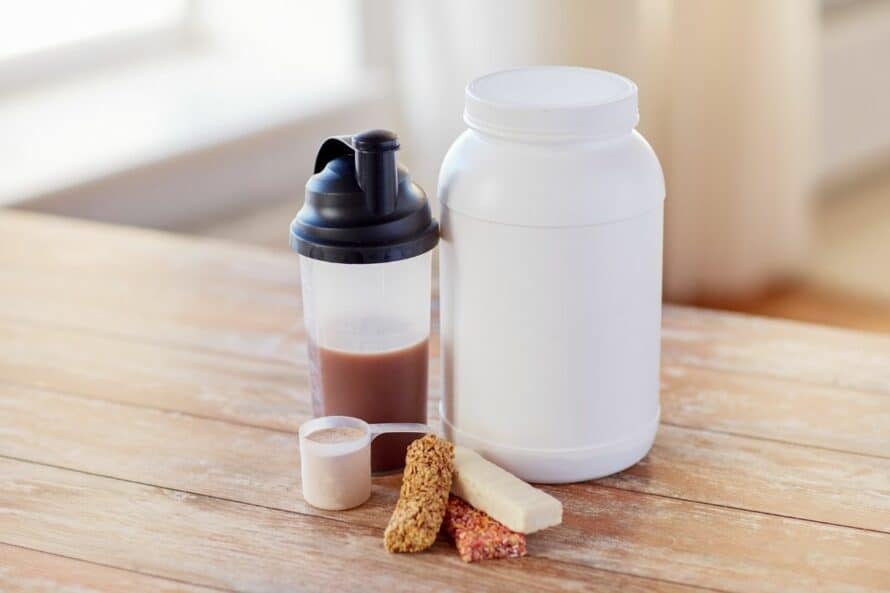
What is Whey Protein?
Whey is a popular supplement used to promote the growth of lean muscle mass. It’s considered a complete or whole protein because it contains all nine essential amino acids.
While the protein comes from milk, it is low in lactose content. Milk is made of two different proteins – whey and casein. So, whey is derived from milk when it’s separated from the casein.
There are three basic types of whey protein to choose from, including:
- Whey protein concentrate — which contains low levels of fat and carbohydrates
- Whey protein isolate — which is processed further to remove all fat and lactose
- Whey protein hydrolysate — which has undergone partial hydrolysis, making it easier to digest
Benefits of Whey Protein
In addition to promoting lean muscle mass, there are a variety of health benefits to using whey protein as part of your workout routine.
The protein is said to assist in:
- weight loss,
- lowering cholesterol,
- reducing blood pressure,
- and lowering the risk of heart disease and stroke.
Drawbacks of Whey Protein
Although this protein is low in lactose content, people with milk allergies may still see negative side effects after digesting whey. When consumed in low doses, the side effects are often minor. But continued use could result in stomach pains and cramps, nausea, fatigue, headache, and reduced appetite.
It also is higher in calories, carbohydrates, and fat compared to BCAA supplements.
Our favorite protein is Garden of Life Raw Organic Protein Vanilla Powder.

When Should I Take Whey Protein?
You may wondering is it best to take whey protein before your workout, after your workout, or another time of day. While there isn’t a wrong answer in our opinion, here are 3 options and their benefits.
- Pre-Workout – 20-30 minutes before a workout if you’ve not eaten a protein-rich meal 3 hours before.
- After Your Workout – We like whey protein powder after a workout to help with muscle protein synthesis that happens after you strength train.
- As a Meal – You can also always add in a protein shake as meal replacement or snack if you’re needing more grams of protein for your daily goal.
- Bedtime – If you’re looking to gain muscle, you may like a casein protein powder versus whey. The reason is it’s a slow releasing protein which will help your body as you sleep.
We recommend choosing pre- or post- workout for your workout — not both. We also add in a casein shake when we’re actively seeking to build more muscle.
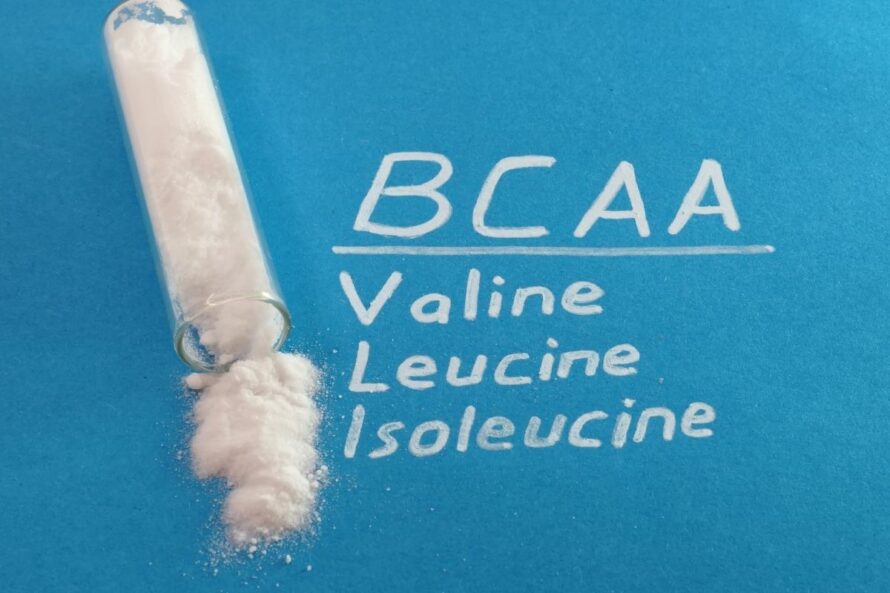
What is BCAA?
Also known as branch-chained amino acids, BCAAs are the building blocks of protein. While there are 20 different amino acids that make up the various proteins in the human body, only 9 of them are considered essential. Out of those 9, you can separate 3 BCAA — leucine, isoleucine, and valine.
Those three acids are made using the same chemical structure known as branch-chain and are often found in protein-rich foods like meat, dairy, and eggs.
While supplements are the easiest way to replace your lost BCAA after a workout, there are several foods that are naturally rich in these amino acids.

Naturally Amino Acid Rich Foods
- Corn
- Meat and poultry, like beef, chicken, and fish
- Eggs
- Beans
- Chickpeas
- Lentils
- Milk, whey, and soy proteins
- Brown rice
- Almonds
- Brazil nuts
- Cashews
- Pumpkin seeds
benefits of bcaas
People refer to this popular dietary supplement used to improve muscle growth. As you work out, your muscles burn amino acids for energy. That means replacing those lost amino acids can be very beneficial to your health.
There are a variety of great benefits of using BCAA as an addition to your workout routine.
The most popular benefits of BCAA’s are:
- increased muscle growth,
- decrease in muscle soreness after your workouts,
- reduced exercise fatigue,
- and prevention of muscle wasting.
Our favorite BCAA-only supplement is Bad Athletics! It tastes great too!
Drawbacks of BCAA
While there aren’t many negative side effects associated with regular BCAA consumption, you may notice some nausea, pain, or headache after long-term usage.
Supplements can also cause negative interactions with some medications, so it’s a good idea to consult your doctor before starting a BCAA regimen if you’re taking medication for diabetes or Parkinson’s, as well as, if you’re taking corticosteroids or a thyroid hormone.
Should you just take BCAAs?
If you’re consuming whey protein already, you don’t need a BCAA supplement because whey has them in it. If you’re allergic to dairy products or need to keep your calories low, BCAA is a great option.
When Should I Take BCAA?
You can consume BCAA pre-workout or post-workout to help you maintain a good level of branch chain aminos that naturally decline with exercise. Taking BCAA before bed can also help maintain your muscle mass.
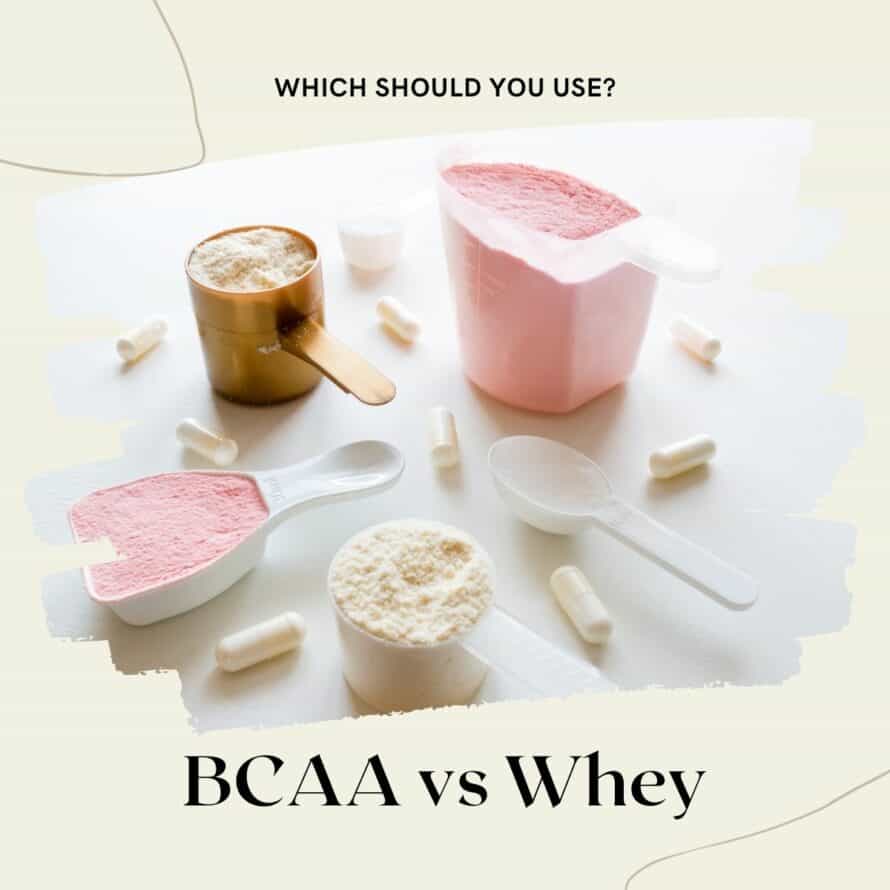
Whey Protein Vs. BCAA
Supplements are a great way to help your body bounce back after a hard workout. But finding the right supplement for you can be difficult if you’re not sure which option to choose.
If you’re weighing the options between BCAA vs whey protein, use these 4 factors to help you decide.
1. Your workout
Deciding between whey protein and BCAA will depend heavily on your workout routine. BCAA is know to help increase your stamina, making it a great option for endurance training and long-duration workouts, like training for a marathon.
But if you’re planning on sticking to moderate workouts, whey protein provides you with all the essential amino acids you’ll need to properly recover.
2. Your Macros
If you’re tracking macros, you may want to use BCAA because if can help increase muscle mass and assist in reducing muscle soreness and fatigue after your workout without a lot of calories, carbs, or fats.
But if building lean muscle is your goal, it may be a better idea to stick to whey protein for your post-workout recovery.
3. Weight loss
When watching your macros, BCAAS may be the best choice because of their lower calorie content.
Another option is to replace a smaller meal (like breakfast or lunch) with a whey protein shake.
4. Cost
Although your workout and weight loss goals are both key factors when deciding on your supplement, it’s also important to consider long-term costs.
BCAA supplements are much more expensive that whey. And when you also take into consideration the fact that whey protein already contains BCAAs, you’ll get more bang for your buck by using whey protein after each workout.
Still not sure?
If you’re still unsure, we typically recommend whey protein to most people because it includes BCAAs in it as well as other essential amino acids.
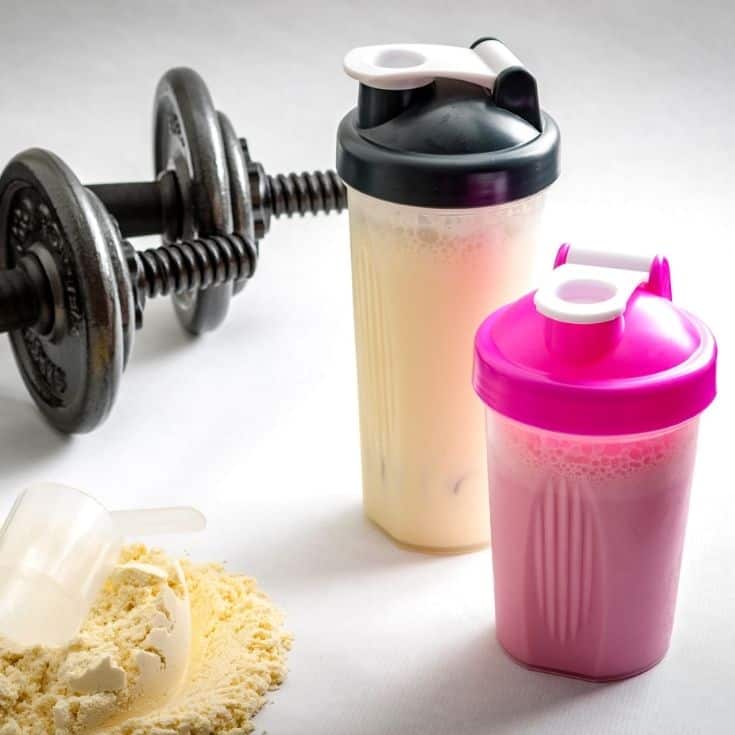
Can You Take Both Whey Protein and BCAA?
Yes, you can take whey protein and BCAA. You’ll just want to take them at different times to get the benefits. You wouldn’t want to add BCAA to your protein shake because whey already has BCAA in it.
We like to do BCAA before a workout and a whey protein shake after a workout.
If you need to pick one supplement – and don’t have an allergy, of course – whey protein is the best bang for your buck.
Final Thoughts
While BCAA can have specific benefits for certain people, whey protein is typically the best option for a muscle-building protein. Not only does it contain BCAA in it, it’s less expensive than BCAA as well!
Also, if you’re eating a high-quality, protein-rich diet of whole foods, you may be able to get in enough protein to hit your fitness goals without either supplement. Supplements just are a convenient and easy way to boost your protein each day.
Our favorite BCAA-only supplement is Bad Athletics! It tastes great too!
The best whey protein supplement we’ve found is Garden of Life Raw Organic Protein Vanilla Powder! It’s a great price too!
You may also like:

